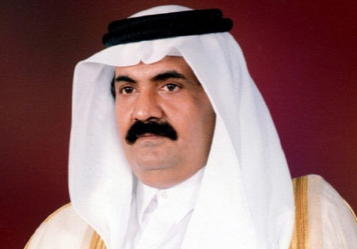The region today known as Qatar was the site for one of the earliest human settlements to come out of Africa. Discoveries indicate towards human settlements based in the coastal regions and centering on fishing and pottery that date as far back as 7500 years. Before the advent of Islam in the early part of the 7th century, Qatar had already established itself as one of most prosperous and popular places in the Arabian Peninsula. Its positioning near one of the most important sea trade routes of the world, ensured that it was constantly involved in the trade of a large number of commodities from 3rd century BC. Pearls, dates, dyes, cloths, fish etc. were traded for teak, sandalwood, blackwood etc. that came from the East.
While there have been many human settlements on the Qatari peninsula, the uncultivable land and arid conditions had ensured that no permanent settlements could come into existence. Consequently, the vast majority of the inhabitants of the region had a nomadic lifestyle. Islam became the religion of the region in the 7th century after Prophet Mohammed sent his envoy, Al Ala Al-Hadrami, to Al-Mundhir Ibn Sawa Al-Tamimi, the ruler of Bahrain and invited him to accept Islam, which he did. In the following centuries leading up to the Portuguese colonization of the region in the 16th century, an increasing number of permanent settlements emerged on the northern side of Qatar. However, these were sparse at best and did not merit being considered as cities, towns or even settlements. Any one of these areas did not contain more than a hundred stone houses. The Portuguese dominance of the region was ended by the Ottoman navy in the 1522.
In 1783, Bahrain annexed Qatar and the political tensions that ensued in the regions thereafter led to the formation of the State of Qatar as we recognize it today. In response to the discontent wrought on the residents of Qatar, the Al Thani family rose to take charge of the leadership of the freedom movement of Qatar. This finally led to the Qatar-Bahrain War of 1867-1868 and Doha and Al Wakrah were sacked and looted by Bahraini forces. However, this act of aggression on part of Bahrain was in violation of the treaty that existed between them and the British. Consequently, the British meted out diplomatic ramifications that ultimately led to the independence of Qatar in 1878.
 (Flag of Qatar)
(Flag of Qatar)
In 1871, Qatar acceded to political pressure from the Ottoman Empire and became a part of it. This was followed by the imposition of a strict reformist agenda by the Ottoman authorities which finally culminated in the Battle of Wajbah, wherein the empire forces were soundly defeated and thereby Qatar gained the status of being an autonomous state within the empire. This did not mean that it had become independent; rather it was still a part of the empire, only it was not under obligation of operating as per the decrees of the Ottomans.
In the wake of the First World War, the Arabs of Qatar rebelled against the Ottomans and gained full independence in 1916 after the collapse of the empire. Thereafter, it came under the protection of the British, which remained until 1971. It was also during this time, or more specifically the 1920s and 30s, that the highly profitable industry of pearling, which had subsisted the region for centuries, came to a sudden halt. This was primarily because of the introduction of the Japanese cultured pearl, which led to a drastic drop in the demand of Qatari pearl. This would have spelled death for the economy of the region. But, within two decades oil was discovered and the industry that would carry forward the development of the region over the remainder of the century had already been found. At this time, the British exercised a considerable influence over the region and wished to exploit the vast oil wealth of the region. However, their plans were put on hold due to the Outbreak of the Second World War, whereafter, the waning international British influence left few avenues for the exploitation of this vital commodity.
 (Former Emir – HH Hamad bin Khalifa Al Thani)
(Former Emir – HH Hamad bin Khalifa Al Thani)
In 1972, Khalifa bin Hamad Al Thani seized power after ousting his father Hamad bin Khalifa Al Thani. After the coup the Qatar General Petroleum Corporation was established and within a short span made Qatar one of the richest nations of the world. In 1995, after another coup d’etat, Hamad bin Khalifa Al Thani took over the throne after ousting his father Khalifa bin Hamad Al Thani. This period was followed by an era of moderate liberalization with the establishment of the Al-Jazeera channel, the appropriation of voting rights to women, the creation of Qatar’s first written constitution and the establishment of a Roman Catholic Church. In June 2013, the reigns of the nation were handed over to Tamim bin Hamad Al Thani by his father Hamad bin Khalifa Al Thani.

(Present Emir – HH Tamim bin Hamad Al Thani)



